Reflective Philosophy of Early Childhood Education Assignment 2
VerifiedAdded on 2023/06/05
|6
|1469
|262
Report
AI Summary
This report, titled "Early Childhood Professional Assignment 2: Reflective Philosophy Report," presents a reflective analysis of an early childhood educator's philosophy. It is divided into three parts: Part A provides a summary of the philosophy covered in a brochure; Part B outlines strategic statements regarding education, emphasizing the importance of play, cultural diversity, environmental factors, family involvement, and community engagement. The educator believes in the rights of children to education, valuing their individual interests and skills. The educator aims to build relationships with children, families, colleagues, and the community. Part C offers reflective statements on the educator's role, the rapid development of children, and the importance of parental involvement and community support. The educator highlights their passion for their role, communication skills, and addresses challenges faced in connecting with communities and parents. The report references various books and journals related to early childhood education and reflective practice.
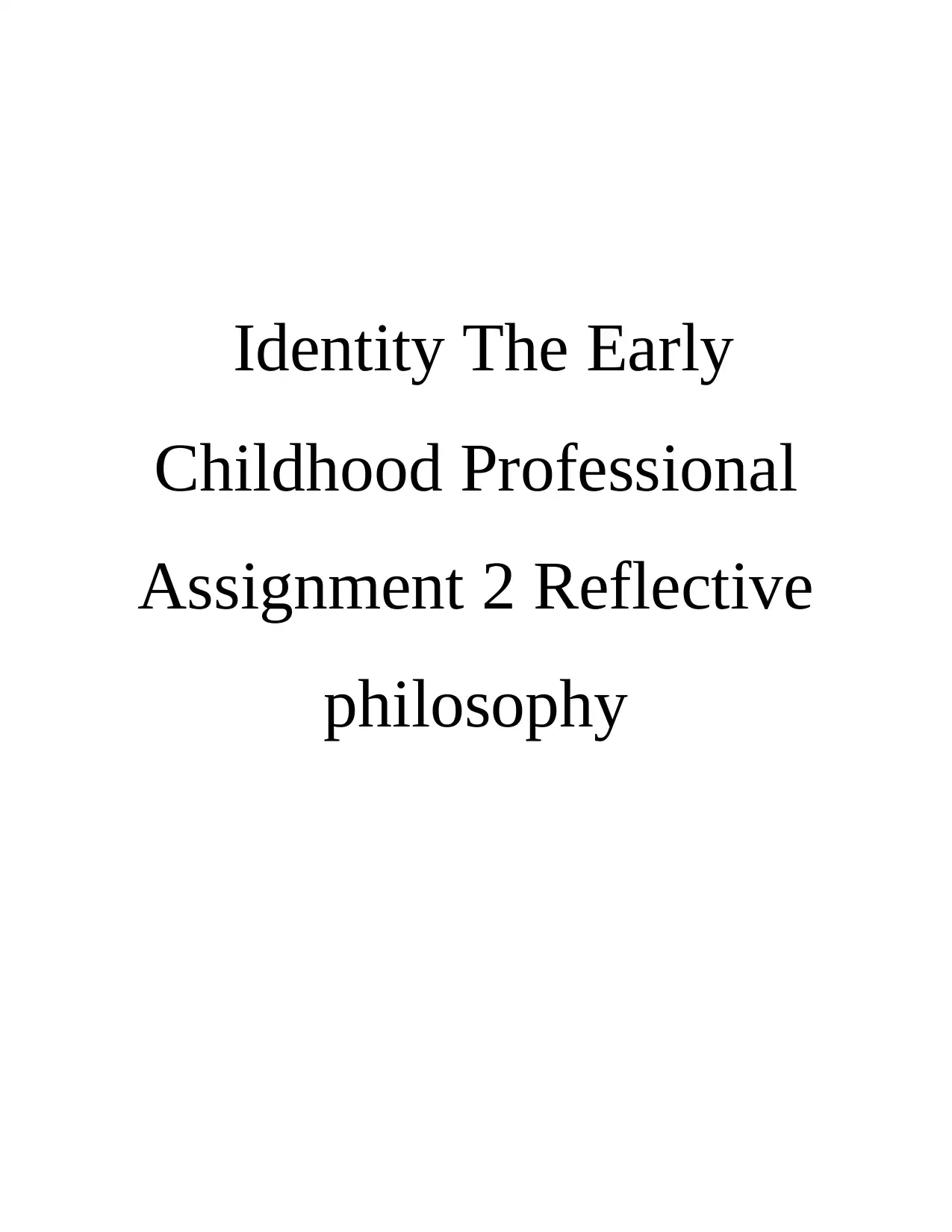
Identity The Early
Childhood Professional
Assignment 2 Reflective
philosophy
Childhood Professional
Assignment 2 Reflective
philosophy
Paraphrase This Document
Need a fresh take? Get an instant paraphrase of this document with our AI Paraphraser
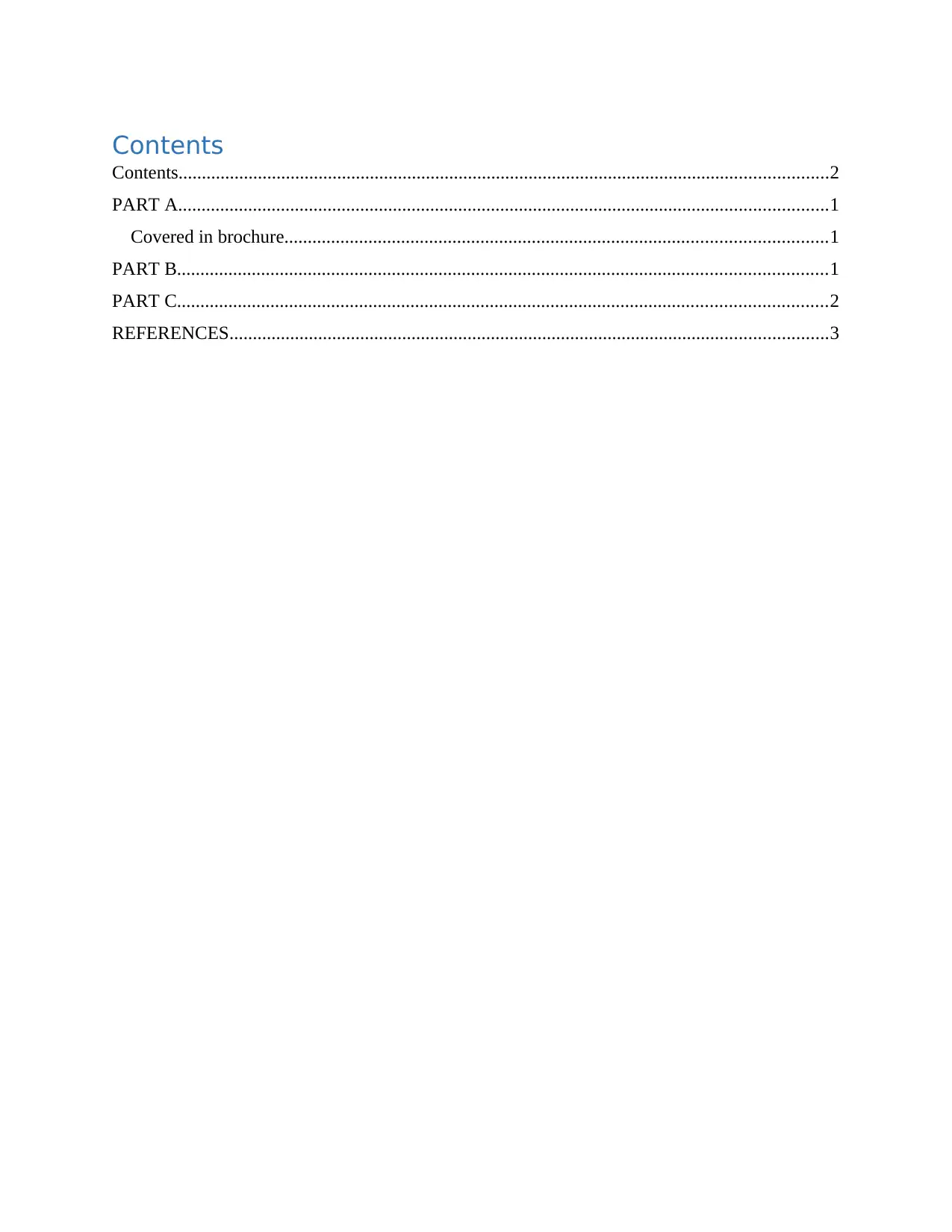
Contents
Contents...........................................................................................................................................2
PART A...........................................................................................................................................1
Covered in brochure....................................................................................................................1
PART B...........................................................................................................................................1
PART C...........................................................................................................................................2
REFERENCES................................................................................................................................3
Contents...........................................................................................................................................2
PART A...........................................................................................................................................1
Covered in brochure....................................................................................................................1
PART B...........................................................................................................................................1
PART C...........................................................................................................................................2
REFERENCES................................................................................................................................3
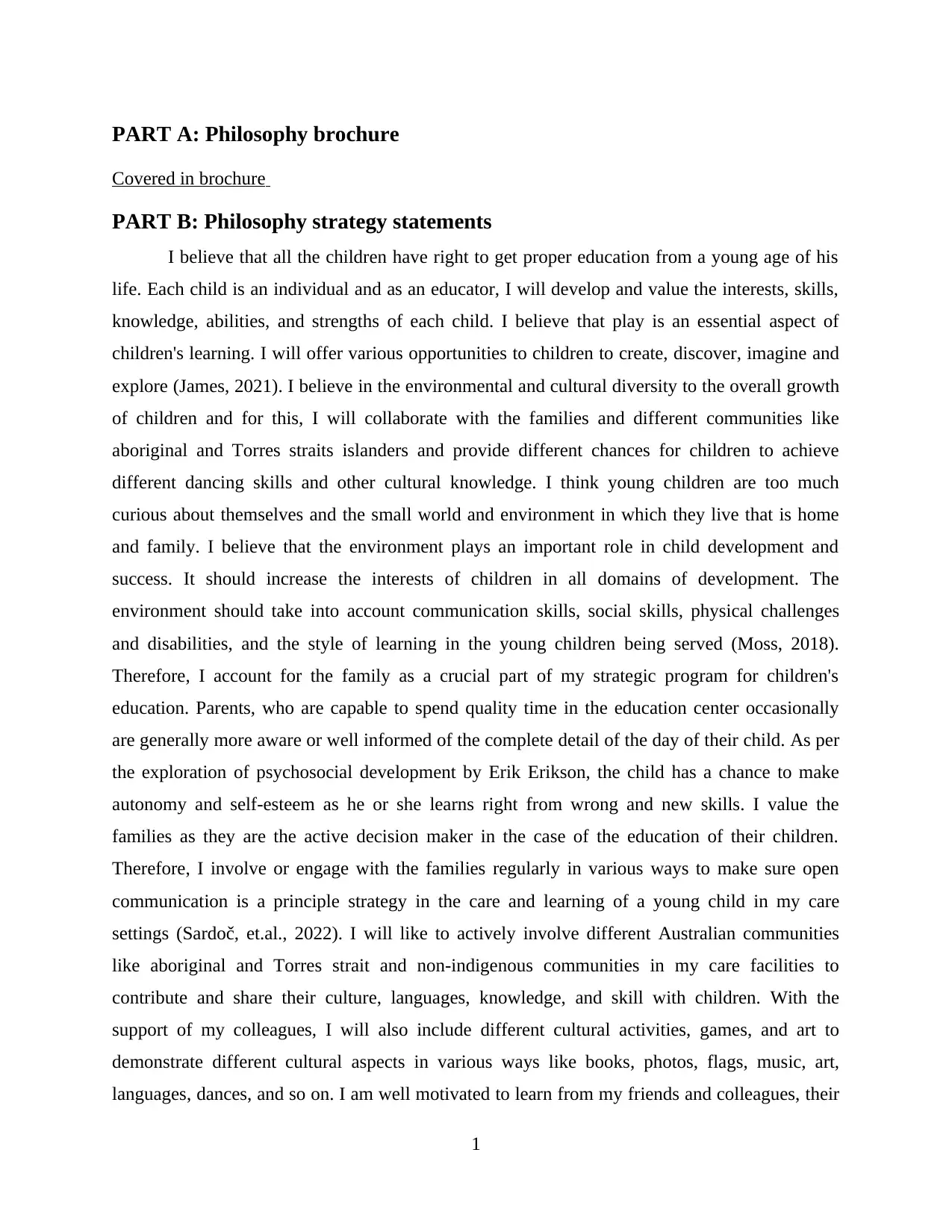
PART A: Philosophy brochure
Covered in brochure
PART B: Philosophy strategy statements
I believe that all the children have right to get proper education from a young age of his
life. Each child is an individual and as an educator, I will develop and value the interests, skills,
knowledge, abilities, and strengths of each child. I believe that play is an essential aspect of
children's learning. I will offer various opportunities to children to create, discover, imagine and
explore (James, 2021). I believe in the environmental and cultural diversity to the overall growth
of children and for this, I will collaborate with the families and different communities like
aboriginal and Torres straits islanders and provide different chances for children to achieve
different dancing skills and other cultural knowledge. I think young children are too much
curious about themselves and the small world and environment in which they live that is home
and family. I believe that the environment plays an important role in child development and
success. It should increase the interests of children in all domains of development. The
environment should take into account communication skills, social skills, physical challenges
and disabilities, and the style of learning in the young children being served (Moss, 2018).
Therefore, I account for the family as a crucial part of my strategic program for children's
education. Parents, who are capable to spend quality time in the education center occasionally
are generally more aware or well informed of the complete detail of the day of their child. As per
the exploration of psychosocial development by Erik Erikson, the child has a chance to make
autonomy and self-esteem as he or she learns right from wrong and new skills. I value the
families as they are the active decision maker in the case of the education of their children.
Therefore, I involve or engage with the families regularly in various ways to make sure open
communication is a principle strategy in the care and learning of a young child in my care
settings (Sardoč, et.al., 2022). I will like to actively involve different Australian communities
like aboriginal and Torres strait and non-indigenous communities in my care facilities to
contribute and share their culture, languages, knowledge, and skill with children. With the
support of my colleagues, I will also include different cultural activities, games, and art to
demonstrate different cultural aspects in various ways like books, photos, flags, music, art,
languages, dances, and so on. I am well motivated to learn from my friends and colleagues, their
1
Covered in brochure
PART B: Philosophy strategy statements
I believe that all the children have right to get proper education from a young age of his
life. Each child is an individual and as an educator, I will develop and value the interests, skills,
knowledge, abilities, and strengths of each child. I believe that play is an essential aspect of
children's learning. I will offer various opportunities to children to create, discover, imagine and
explore (James, 2021). I believe in the environmental and cultural diversity to the overall growth
of children and for this, I will collaborate with the families and different communities like
aboriginal and Torres straits islanders and provide different chances for children to achieve
different dancing skills and other cultural knowledge. I think young children are too much
curious about themselves and the small world and environment in which they live that is home
and family. I believe that the environment plays an important role in child development and
success. It should increase the interests of children in all domains of development. The
environment should take into account communication skills, social skills, physical challenges
and disabilities, and the style of learning in the young children being served (Moss, 2018).
Therefore, I account for the family as a crucial part of my strategic program for children's
education. Parents, who are capable to spend quality time in the education center occasionally
are generally more aware or well informed of the complete detail of the day of their child. As per
the exploration of psychosocial development by Erik Erikson, the child has a chance to make
autonomy and self-esteem as he or she learns right from wrong and new skills. I value the
families as they are the active decision maker in the case of the education of their children.
Therefore, I involve or engage with the families regularly in various ways to make sure open
communication is a principle strategy in the care and learning of a young child in my care
settings (Sardoč, et.al., 2022). I will like to actively involve different Australian communities
like aboriginal and Torres strait and non-indigenous communities in my care facilities to
contribute and share their culture, languages, knowledge, and skill with children. With the
support of my colleagues, I will also include different cultural activities, games, and art to
demonstrate different cultural aspects in various ways like books, photos, flags, music, art,
languages, dances, and so on. I am well motivated to learn from my friends and colleagues, their
1
⊘ This is a preview!⊘
Do you want full access?
Subscribe today to unlock all pages.

Trusted by 1+ million students worldwide
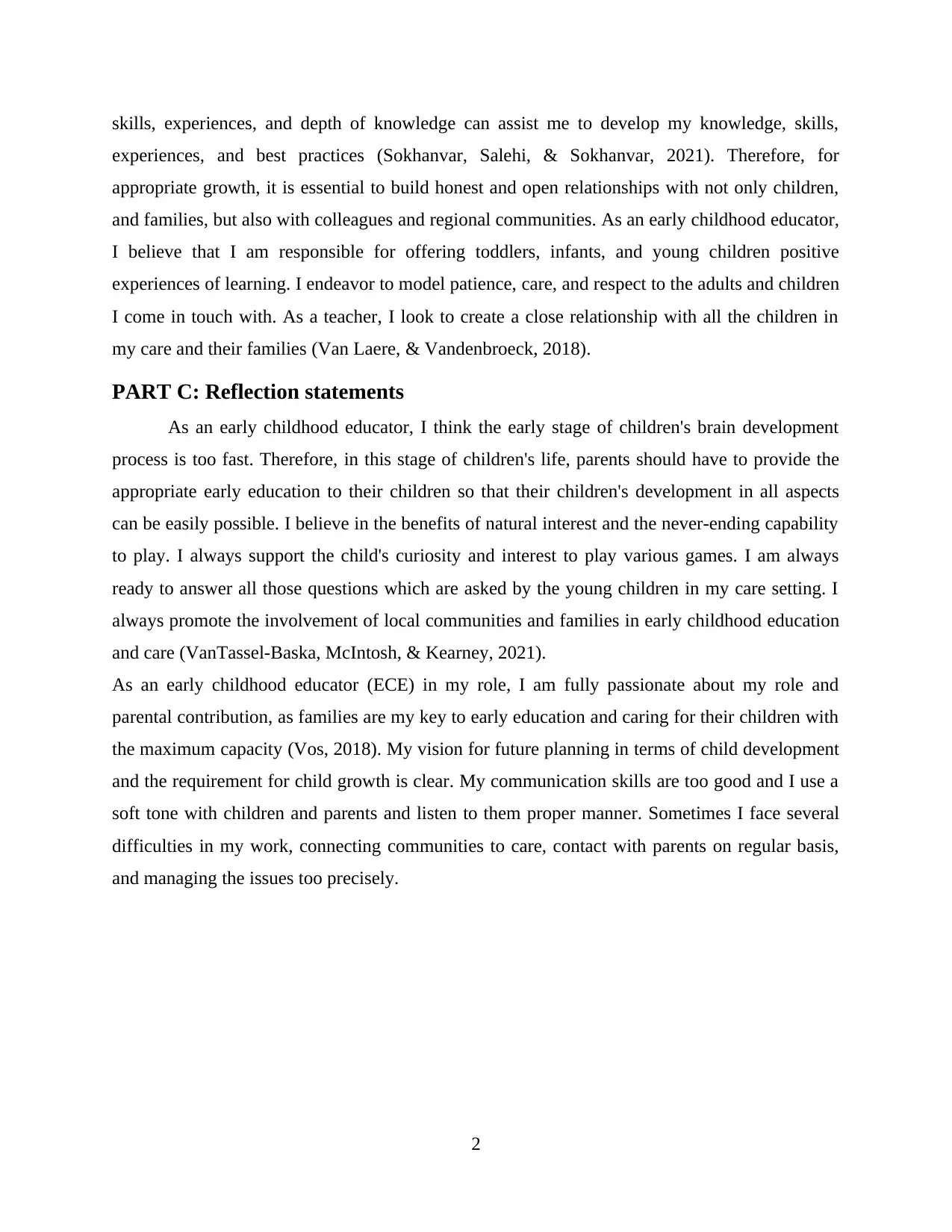
skills, experiences, and depth of knowledge can assist me to develop my knowledge, skills,
experiences, and best practices (Sokhanvar, Salehi, & Sokhanvar, 2021). Therefore, for
appropriate growth, it is essential to build honest and open relationships with not only children,
and families, but also with colleagues and regional communities. As an early childhood educator,
I believe that I am responsible for offering toddlers, infants, and young children positive
experiences of learning. I endeavor to model patience, care, and respect to the adults and children
I come in touch with. As a teacher, I look to create a close relationship with all the children in
my care and their families (Van Laere, & Vandenbroeck, 2018).
PART C: Reflection statements
As an early childhood educator, I think the early stage of children's brain development
process is too fast. Therefore, in this stage of children's life, parents should have to provide the
appropriate early education to their children so that their children's development in all aspects
can be easily possible. I believe in the benefits of natural interest and the never-ending capability
to play. I always support the child's curiosity and interest to play various games. I am always
ready to answer all those questions which are asked by the young children in my care setting. I
always promote the involvement of local communities and families in early childhood education
and care (VanTassel-Baska, McIntosh, & Kearney, 2021).
As an early childhood educator (ECE) in my role, I am fully passionate about my role and
parental contribution, as families are my key to early education and caring for their children with
the maximum capacity (Vos, 2018). My vision for future planning in terms of child development
and the requirement for child growth is clear. My communication skills are too good and I use a
soft tone with children and parents and listen to them proper manner. Sometimes I face several
difficulties in my work, connecting communities to care, contact with parents on regular basis,
and managing the issues too precisely.
2
experiences, and best practices (Sokhanvar, Salehi, & Sokhanvar, 2021). Therefore, for
appropriate growth, it is essential to build honest and open relationships with not only children,
and families, but also with colleagues and regional communities. As an early childhood educator,
I believe that I am responsible for offering toddlers, infants, and young children positive
experiences of learning. I endeavor to model patience, care, and respect to the adults and children
I come in touch with. As a teacher, I look to create a close relationship with all the children in
my care and their families (Van Laere, & Vandenbroeck, 2018).
PART C: Reflection statements
As an early childhood educator, I think the early stage of children's brain development
process is too fast. Therefore, in this stage of children's life, parents should have to provide the
appropriate early education to their children so that their children's development in all aspects
can be easily possible. I believe in the benefits of natural interest and the never-ending capability
to play. I always support the child's curiosity and interest to play various games. I am always
ready to answer all those questions which are asked by the young children in my care setting. I
always promote the involvement of local communities and families in early childhood education
and care (VanTassel-Baska, McIntosh, & Kearney, 2021).
As an early childhood educator (ECE) in my role, I am fully passionate about my role and
parental contribution, as families are my key to early education and caring for their children with
the maximum capacity (Vos, 2018). My vision for future planning in terms of child development
and the requirement for child growth is clear. My communication skills are too good and I use a
soft tone with children and parents and listen to them proper manner. Sometimes I face several
difficulties in my work, connecting communities to care, contact with parents on regular basis,
and managing the issues too precisely.
2
Paraphrase This Document
Need a fresh take? Get an instant paraphrase of this document with our AI Paraphraser
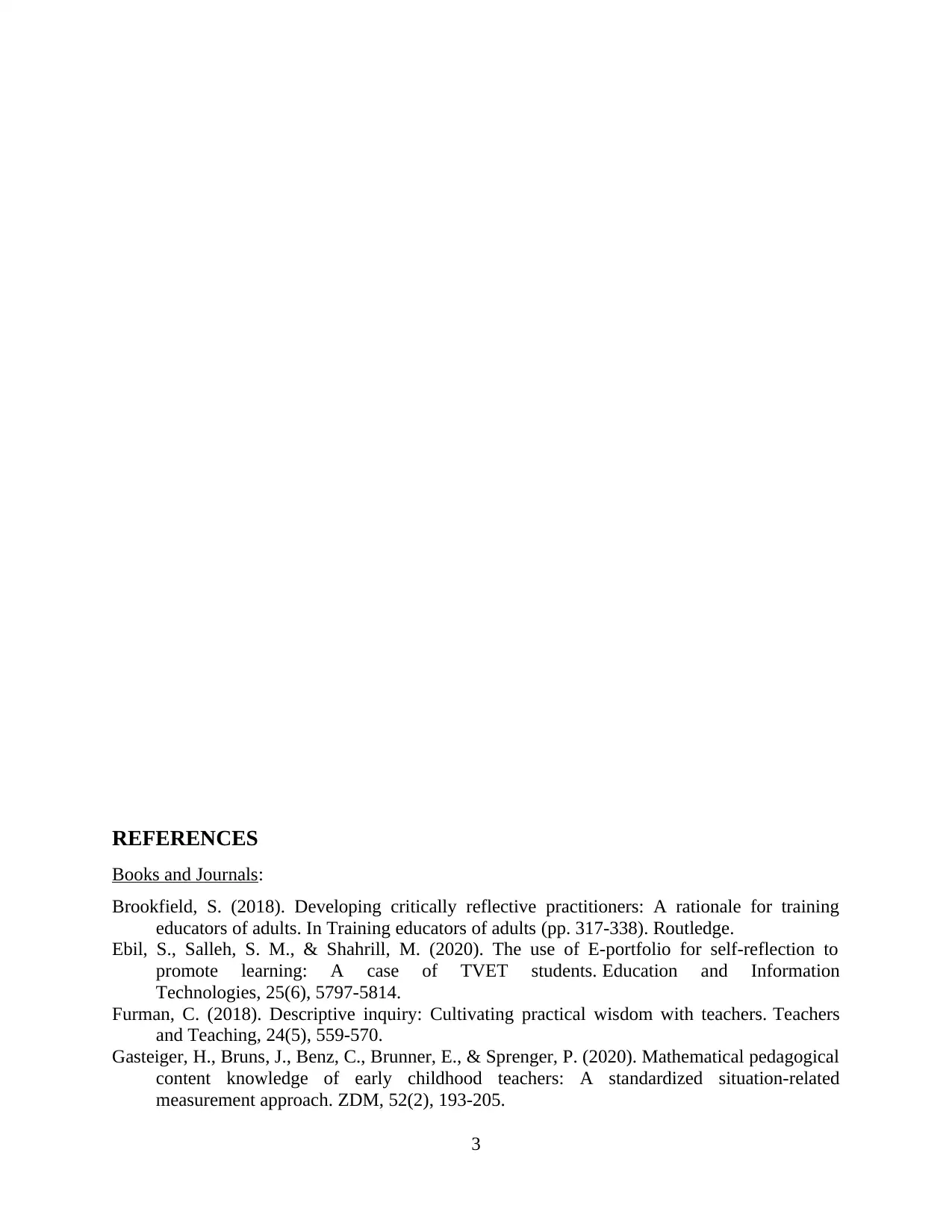
REFERENCES
Books and Journals:
Brookfield, S. (2018). Developing critically reflective practitioners: A rationale for training
educators of adults. In Training educators of adults (pp. 317-338). Routledge.
Ebil, S., Salleh, S. M., & Shahrill, M. (2020). The use of E-portfolio for self-reflection to
promote learning: A case of TVET students. Education and Information
Technologies, 25(6), 5797-5814.
Furman, C. (2018). Descriptive inquiry: Cultivating practical wisdom with teachers. Teachers
and Teaching, 24(5), 559-570.
Gasteiger, H., Bruns, J., Benz, C., Brunner, E., & Sprenger, P. (2020). Mathematical pedagogical
content knowledge of early childhood teachers: A standardized situation-related
measurement approach. ZDM, 52(2), 193-205.
3
Books and Journals:
Brookfield, S. (2018). Developing critically reflective practitioners: A rationale for training
educators of adults. In Training educators of adults (pp. 317-338). Routledge.
Ebil, S., Salleh, S. M., & Shahrill, M. (2020). The use of E-portfolio for self-reflection to
promote learning: A case of TVET students. Education and Information
Technologies, 25(6), 5797-5814.
Furman, C. (2018). Descriptive inquiry: Cultivating practical wisdom with teachers. Teachers
and Teaching, 24(5), 559-570.
Gasteiger, H., Bruns, J., Benz, C., Brunner, E., & Sprenger, P. (2020). Mathematical pedagogical
content knowledge of early childhood teachers: A standardized situation-related
measurement approach. ZDM, 52(2), 193-205.
3
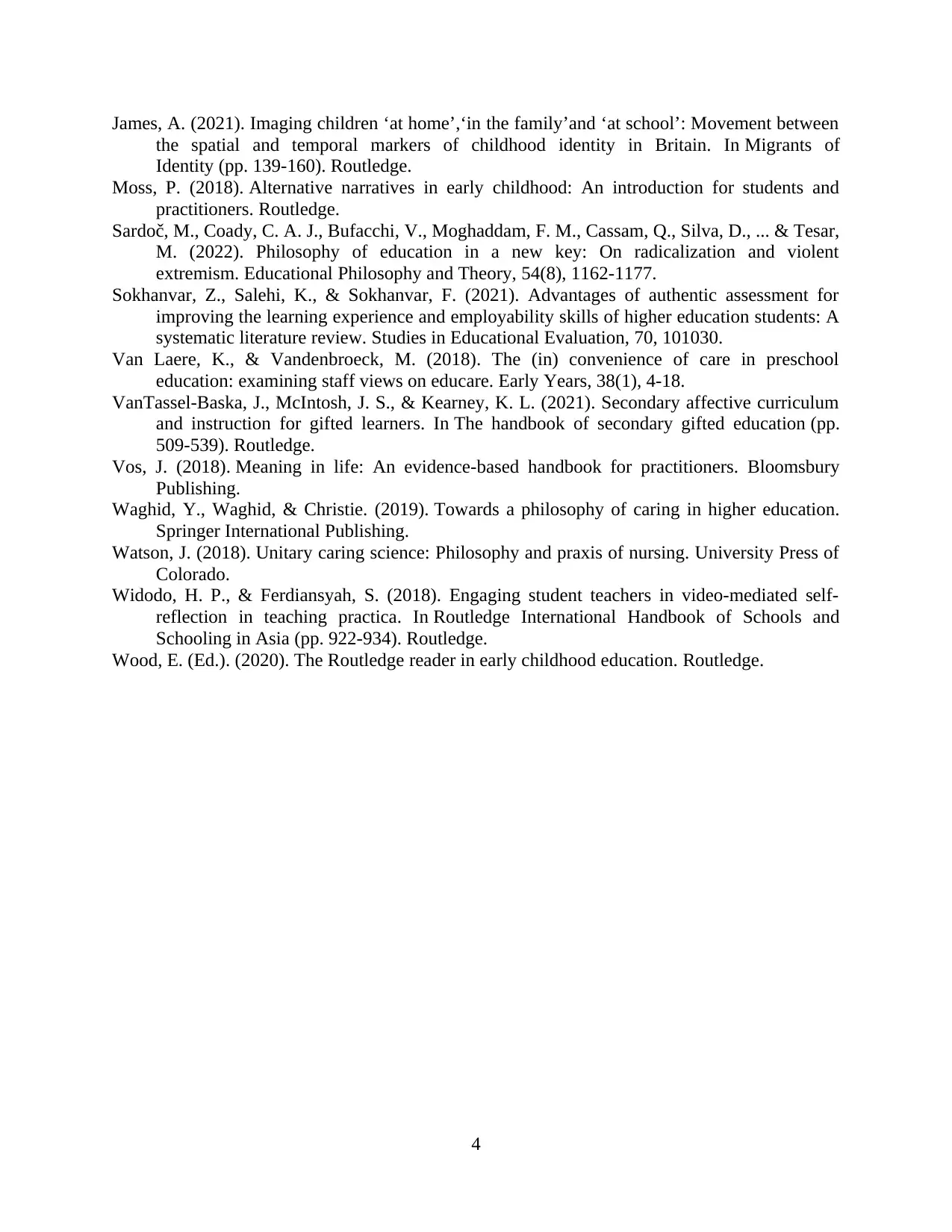
James, A. (2021). Imaging children ‘at home’,‘in the family’and ‘at school’: Movement between
the spatial and temporal markers of childhood identity in Britain. In Migrants of
Identity (pp. 139-160). Routledge.
Moss, P. (2018). Alternative narratives in early childhood: An introduction for students and
practitioners. Routledge.
Sardoč, M., Coady, C. A. J., Bufacchi, V., Moghaddam, F. M., Cassam, Q., Silva, D., ... & Tesar,
M. (2022). Philosophy of education in a new key: On radicalization and violent
extremism. Educational Philosophy and Theory, 54(8), 1162-1177.
Sokhanvar, Z., Salehi, K., & Sokhanvar, F. (2021). Advantages of authentic assessment for
improving the learning experience and employability skills of higher education students: A
systematic literature review. Studies in Educational Evaluation, 70, 101030.
Van Laere, K., & Vandenbroeck, M. (2018). The (in) convenience of care in preschool
education: examining staff views on educare. Early Years, 38(1), 4-18.
VanTassel-Baska, J., McIntosh, J. S., & Kearney, K. L. (2021). Secondary affective curriculum
and instruction for gifted learners. In The handbook of secondary gifted education (pp.
509-539). Routledge.
Vos, J. (2018). Meaning in life: An evidence-based handbook for practitioners. Bloomsbury
Publishing.
Waghid, Y., Waghid, & Christie. (2019). Towards a philosophy of caring in higher education.
Springer International Publishing.
Watson, J. (2018). Unitary caring science: Philosophy and praxis of nursing. University Press of
Colorado.
Widodo, H. P., & Ferdiansyah, S. (2018). Engaging student teachers in video-mediated self-
reflection in teaching practica. In Routledge International Handbook of Schools and
Schooling in Asia (pp. 922-934). Routledge.
Wood, E. (Ed.). (2020). The Routledge reader in early childhood education. Routledge.
4
the spatial and temporal markers of childhood identity in Britain. In Migrants of
Identity (pp. 139-160). Routledge.
Moss, P. (2018). Alternative narratives in early childhood: An introduction for students and
practitioners. Routledge.
Sardoč, M., Coady, C. A. J., Bufacchi, V., Moghaddam, F. M., Cassam, Q., Silva, D., ... & Tesar,
M. (2022). Philosophy of education in a new key: On radicalization and violent
extremism. Educational Philosophy and Theory, 54(8), 1162-1177.
Sokhanvar, Z., Salehi, K., & Sokhanvar, F. (2021). Advantages of authentic assessment for
improving the learning experience and employability skills of higher education students: A
systematic literature review. Studies in Educational Evaluation, 70, 101030.
Van Laere, K., & Vandenbroeck, M. (2018). The (in) convenience of care in preschool
education: examining staff views on educare. Early Years, 38(1), 4-18.
VanTassel-Baska, J., McIntosh, J. S., & Kearney, K. L. (2021). Secondary affective curriculum
and instruction for gifted learners. In The handbook of secondary gifted education (pp.
509-539). Routledge.
Vos, J. (2018). Meaning in life: An evidence-based handbook for practitioners. Bloomsbury
Publishing.
Waghid, Y., Waghid, & Christie. (2019). Towards a philosophy of caring in higher education.
Springer International Publishing.
Watson, J. (2018). Unitary caring science: Philosophy and praxis of nursing. University Press of
Colorado.
Widodo, H. P., & Ferdiansyah, S. (2018). Engaging student teachers in video-mediated self-
reflection in teaching practica. In Routledge International Handbook of Schools and
Schooling in Asia (pp. 922-934). Routledge.
Wood, E. (Ed.). (2020). The Routledge reader in early childhood education. Routledge.
4
⊘ This is a preview!⊘
Do you want full access?
Subscribe today to unlock all pages.

Trusted by 1+ million students worldwide
1 out of 6
Related Documents
Your All-in-One AI-Powered Toolkit for Academic Success.
+13062052269
info@desklib.com
Available 24*7 on WhatsApp / Email
![[object Object]](/_next/static/media/star-bottom.7253800d.svg)
Unlock your academic potential
Copyright © 2020–2026 A2Z Services. All Rights Reserved. Developed and managed by ZUCOL.





